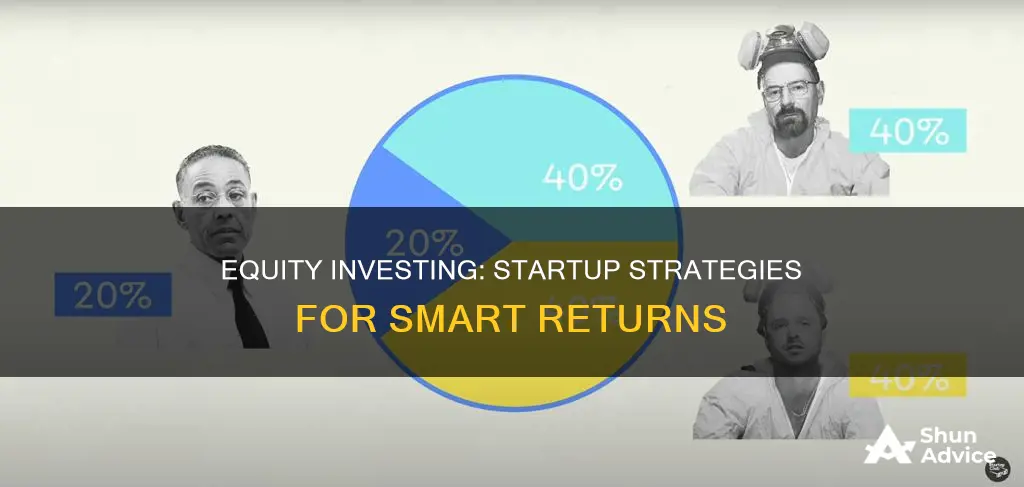
Investing in startups is a potentially lucrative way to get in on the ground floor of something exciting and innovative. But it's also a high-risk move – the majority of startups fail, and even if you do your research, you could lose everything. If you're thinking about investing in a startup for equity, there are a few things you should know. First, understand the different types of investment contracts: debt, convertible notes, stock, and dividends. Then, consider the advantages and disadvantages of different investment pathways, such as angel investing, crowd equity or crowdfunding, and direct private equity or venture capital funds. Remember to do your research, diversify your investments, and only invest what you can afford to lose.
| Characteristics | Values |
|---|---|
| Type of Investment | Private Equity |
| Type of Company | Privately-held companies not listed on a public stock exchange |
| Company Stage | Early-stage innovations to later-stage commercializations |
| Investor Type | Institutional investors, ultra-high net worth individuals, non-accredited investors |
| Investor Risk | High risk, long holding periods |
| Investor Return | Proportionate to equity share |
| Investor Loss | Loss of all money invested |
| Investor Due Diligence | Research, network, and portfolio diversification |
| Investor Amount | $100 to millions of dollars |
| Investor Diversification | Multiple small investments in different startups |
What You'll Learn

Understanding the risks
Investing in startups is a risky business. You should only invest if you are prepared to lose all the money you put in. For investments in startups, total loss of capital is a highly likely outcome.
Principal Risk
The principal risk is that you may lose your entire investment. There are many situations in which the company may fail, or you may not be able to sell the stock you own in the company.
Returns Risk
The amount of return on investment, if any, is highly variable and not guaranteed. Some startups may be successful and generate significant returns, but many will not be successful and will only generate small returns, if any at all.
Returns Delay
Any returns may take several years to materialize, and most startups take five to seven years to generate any investment return, if at all. It may also take many years before you know if a startup investment will generate any return.
Liquidity Risk
It may be challenging to sell your securities. Startup investments are privately held companies and are not traded on a public stock exchange. Also, there is currently no readily available secondary market for private buyers to purchase your securities.
Instrument Risk
You may be investing in preferred equity, common equity, or convertible notes. These securities instruments all have different inherent risks caused by their structure. It is important to understand the nature of the securities instrument you are investing in.
Dilution
Startup companies may need to raise additional capital in the future. When these new investors invest in the company, they may receive newly issued securities, and these new securities will dilute the percentage ownership you have in the business.
Minority Stake
As a minor shareholder in the business, you may have fewer voting rights or less ability to influence the company's direction than more prominent investors. In some cases, this may mean that your securities are treated less preferentially than more oversized security holders.
Valuation Risk
Unlike publicly traded companies valued publicly through market-driven stock prices, the valuation of private companies, especially startups, is difficult to assess. The issuer will set the share price for your investment, and you may risk overpaying for your acquisition. The price you pay for your investment may have a material impact on your eventual return if any at all.
Failure Risk
Investments in startups are speculative, and these companies often fail. Unlike an investment in a mature business where there is a track record of revenue and income, the success of a startup often relies on the development of a new product or service that may or may not find a market.
Revenue Risk
The company is still in an early phase and may just be beginning to implement its business plan. There can be no assurance that it will ever operate profitably. The likelihood of achieving profitability should be considered in light of the problems, expenses, difficulties, complications, and delays usually encountered by companies in their early stages of development. The company may not be successful in attaining the objectives necessary for it to overcome these risks and uncertainties.
Funding Risk
The company may require funds in excess of its existing cash resources to fund operating expenses, develop new products, expand its marketing capabilities, and finance general and administrative activities. Due to market conditions at the time the company needs additional funding, it is possible that the company will be unable to obtain additional funding when it needs it, or the terms of any available funding may be unfavorable. If the company is unable to obtain additional funding, it may not be able to repay debts when they are due or the new funding may excessively dilute existing investors. If the company is unable to obtain additional funding as and when needed, it could be forced to delay its development, marketing, and expansion efforts and, if it continues to experience losses, potentially cease operations.
Disclosure Risks
The company is at an early stage and may only be able to provide limited information about its business plan and operations because it does not have fully developed operations or a long trading history. The company is also only obligated to provide limited information regarding its business and financial affairs to investors.
Personnel Risks
An investment in a startup is also an investment in the management of the company. Being able to execute the business plan is often an important factor in whether the business is viable and successful. You should be aware that a portion of your investment may fund the compensation of the company’s employees, including its management. You should carefully review any disclosure regarding the company’s use of proceeds. You should also carefully consider the experience and expertise of the management team.
Fraud Risks
It is possible that certain people involved in the company may commit fraud or mislead investors. If fraud or misleading conduct occurs, then your total investment may be lost. You should carefully review any disclosures regarding the company’s management team and make your own assessment of the likelihood of any potential fraud.
Lack of Professional Guidance
Many successful startups partially attribute their early success to the guidance of professional investors (e.g. angel investors and venture capital firms). These investors often play an important role through their resources, contacts, and experience in assisting startup companies in executing their business plans. A startup company primarily financed by smaller investors may not have the benefit of such professional investors. You should consider the existing professional investors in the company and whether or not they or any other professional investors are participating in the current round.
Growth Risk
For a startup to succeed, it will need to expand significantly. There can be no assurance that it will achieve this expansion. Expansion may place a significant strain on the company’s management, operational and financial resources. To manage growth, the company will be required to implement operational and financial systems, procedures, and controls. It also will be required to expand its finance, administrative and operations staff. There can be no assurance that the company’s current and planned personnel, systems, procedures, and controls will be adequate to support its future operations. The company’s failure to manage growth effectively could have a material adverse effect on its business, results of operations, and financial condition.
Competition Risk
The startup may face competition from other companies, some of which might have received more funding than the startup has. One or more of the company’s competitors could offer services similar to those offered by the company at significantly lower prices, which would cause downward pressure on the prices the company would be able to charge for its services. If the company is not able to charge the prices it anticipates charging for its services, there may be a material adverse effect on the company’s results of operations and financial condition.
Market Demand Risk
While the company believes that there will be customer demand for its products, there is no assurance that there will be broad market acceptance of the company’s offerings. There also may not be broad market acceptance of the company’s offerings if its competitors offer products that are preferred by prospective customers. In such an event, there may be a material adverse effect on the company’s results of operations and financial condition, and the company may not be able to achieve its goals.
Control Risks
Because the company’s <
Investing: The Smart Way to Grow Your Money
You may want to see also

Diversifying your portfolio
Spread the Wealth
Diversification is not limited to just stocks vs. bonds. While equities offer high returns, don't put all your money in one stock, one sector, or even one market. Consider investing in a range of companies you know and trust and even use in your daily life. You can also explore commodities, exchange-traded funds (ETFs), and real estate investment trusts (REITs). Think globally and spread your risk to increase your potential rewards.
Consider Index or Bond Funds
Index funds and fixed-income funds are excellent additions to your portfolio. These funds track various indexes and try to match the performance of broad indexes like the bond market. They are a wonderful long-term diversification strategy and often come with low fees, putting more money back in your pocket. However, their passively managed nature might be a drawback in inefficient markets.
Keep Building Your Portfolio
Regularly add to your investments. If you have a substantial sum to invest, consider dollar-cost averaging to smooth out market volatility. This strategy involves investing the same amount of money over a period, buying more shares when prices are low and fewer when prices are high.
Know When to Get Out
While buying and holding, and dollar-cost averaging are sound strategies, stay informed about your investments and the overall market conditions. This awareness will help you know when to cut your losses, sell, and move on to your next investment.
Keep an Eye on Commissions
Understand the fees you are paying, whether monthly or transactional. While many online brokers now offer commission-free trading in stocks and ETFs, trading mutual funds, illiquid stocks, and alternative asset classes often incurs fees. Ensure you are getting value for the fees charged and keep yourself updated on any changes to your fee structure.
Use Target-Date Funds
Target-date funds are an excellent way to maintain a diversified portfolio, especially if you prefer a "set it and forget it" approach. These funds automatically adjust your portfolio allocation over time, investing in riskier assets like stocks when you're young and gradually shifting to safer options like bonds or cash as you get closer to your goal, usually retirement.
Rebalance Your Portfolio Periodically
Over time, the performance of your investments will cause shifts in your portfolio's allocation. To maintain diversification, rebalance your portfolio occasionally to return it to the appropriate weight for each investment. This task is typically done no more than quarterly, but you should check your portfolio at least twice a year.
Think Global
Don't limit yourself to investment opportunities in your home country. Explore funds focused on emerging markets or other regions, such as Europe or China, which offer attractive long-term growth rates. International diversification also protects you from negative events specific to your home country or region.
Be Aware of Over-Diversification
While diversification is essential, it can be taken too far. Not all investments add diversification benefits, and overlapping investments may not reduce risk. For example, holding multiple small-cap stock funds or total stock market funds may not provide additional risk reduction. Focus on uncorrelated assets or those that move in opposite directions to achieve true diversification.
Remember that investing in startups carries a high risk of failure and long holding periods. Ensure you are comfortable with the level of risk and always conduct thorough due diligence before investing.
Investment Management: Competitive or Cutthroat?
You may want to see also

Due diligence
The business due diligence stage involves investigating the viability of the deal, including reviewing the management team, market potential, product or service, and business model. The legal due diligence stage involves a lawyer completing a legal review.
During the due diligence process, startups should be completely transparent to build confidence with potential investors. This means being transparent about pending lawsuits, patent issues, dissatisfied employees, or business missteps. Startups should also be prepared to provide a large amount of documentation, including financial statements, tax statements, balance sheets, profit and loss statements, budgets, and more.
Investment Management: A Decade of Portfolio Experience
You may want to see also

Different ways to invest
There are two main ways to invest in early-stage startups: investing in a priced equity round and investing in convertible securities.
- Investing in a priced equity round: Investors purchase shares in a startup at a fixed price. This is more common for investors in later-stage startups.
- Investing in convertible securities: The investment amount eventually “converts” into equity. This is more common for seed and early-stage investors.
Investing in Equity Crowdfunding Platforms
Equity crowdfunding platforms such as Wefunder allow investors to invest in startups and small businesses for as little as $100. Investors receive equity in exchange for their money.
Investing as an Angel Investor
Angel investors are typically high-net-worth individuals who invest their own money in a startup. They usually receive a large slice of equity as they are taking on a high level of financial risk.
Investing as a Venture Capitalist
Venture capitalists (VCs) invest other people's money in a startup in exchange for equity. They are willing to take on the risk of losing money because owning a percentage of a successful startup can be very profitable.
Investing as a Formal or Personal Advisor
Advisors are compensated for their contributions to a startup with equity. Formal advisors are those who have strategic insights into the business and are listed on the company's site, whereas personal advisors are those who are consulted infrequently for specific advice. Formal advisors typically receive between 0.1% and 0.5% equity, and personal advisors may or may not receive equity.
Investing My Daughter's Savings: Strategies for Long-Term Growth
You may want to see also

How to make money from your investment
Investing in startups is a risky business, but it can also be lucrative. Here are some ways to make money from your investment:
Debt Investment
Your investment is treated as a loan to the startup, which earns interest over time. The contract may stipulate a fixed return, such as double your initial investment, or it could be variable depending on the company's performance.
Convertible Notes
This is a form of debt that converts into shares of stock when the startup reaches certain milestones, such as securing new rounds of funding. You make a profit on your investment once the company is acquired or goes public.
Stock Purchase
Later-stage startups may allow you to buy shares of stock in the company, much like investing in a publicly traded company. However, it's important to note that these shares are often illiquid, meaning you can't easily sell them. To make a profit, you'll need to hold on to your shares until the startup is acquired or goes public.
Dividends
Some successful, later-stage startups may offer investors the opportunity to buy shares of stock that pay annual dividends. This provides a more traditional form of investment income.
High Growth Potential
Startups have the potential for exponential growth. If you invest in a startup that succeeds, your returns could be far greater than what you might achieve with more established companies or funds.
Important Considerations:
- Risk: Startup investing is high-risk; about 90% of startups fail. You should only invest money you can afford to lose.
- Diversification: To mitigate risk, it's recommended to make multiple small investments in different startups rather than a single large investment.
- Long-Term Commitment: Startup investments are typically illiquid and take time to mature. You should expect your money to be tied up for at least three to five years, if not more.
Portfolio Investment Scheme: India's Investment Gateway
You may want to see also
Frequently asked questions
Equity investing in startups refers to investing in privately-held companies that are not listed on a public stock exchange. Your capital is exchanged for equity—a portion of ownership in a company and rights to its potential future profits.
Startup investing is a high-risk, high-reward endeavour. Startups are illiquid and super risky—about 90% of them fail. If the startup you invest in goes bankrupt, you could lose your entire investment.
Investing in startups gives you a front-row seat to innovative solutions for challenging problems and the development of new technologies. If the startup succeeds, there's potential for exponential growth and massive returns.
You can invest in startups via crowdfunding sites such as Republic, Wefunder, and SeedInvest. These platforms offer curated selections of companies across various industries and stages of development. The minimum buy-ins vary, but some platforms allow you to get started with as little as $100.







